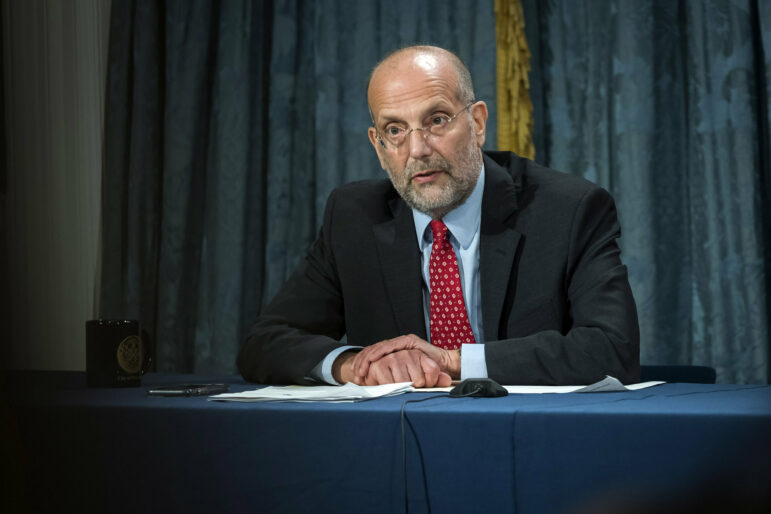Steve Banks, who served as social services commissioner under former Mayor Bill de Blasio, is returning to a familiar posture—opposing City Hall in litigation over the city’s unique shelter rights for the homeless, which Mayor Eric Adams has sought to weaken in recent months.

Ed Reed/Mayoral Photography Office
Former Department of Social Services Commissioner Steven Banks at a press conference in 2020.Steve Banks, who served as social services commissioner under former Mayor Bill de Blasio, is returning to a familiar posture—opposing City Hall in litigation over the city’s unique shelter rights for the homeless.
Banks, who now works at the white shoe law firm Paul Weiss, filed notice Tuesday that he will be joining up with Legal Aid attorneys, now that Mayor Eric Adams has sought to reopen a consent decree in a landmark lawsuit filed by a homeless man named Robert Callahan, which established the right to shelter for homeless men decades ago.
Today, the city’s “right to shelter” provides a basic safety net allowing anyone who wants a shelter bed to get one, at least temporarily. It also establishes minimum standards for Department of Homeless Services shelter facilities, including that families be housed in sites with access to a kitchen.
Mayor Adams requested to modify the decree in late May, citing an influx of tens of thousands of asylum seekers to New York City from the southern border and other U.S. cities.
In a letter to the court, the Adams administration sought leave to pause its obligation to provide shelter to single adults if it “lacks the resources and capacity to establish and maintain sufficient shelter sites, staffing, and security to provide safe and appropriate shelter.”
There is a case conference scheduled for Wednesday afternoon in Manhattan. Callahan was lead plaintiff on the class action suit, which was brought in 1979 in conjunction with the Coalition for the Homeless.
Reached for comment, Banks criticized the administration’s move to revisit the case. “It is hard to see how asking a court to suspend the right to shelter that is secured by the New York State Constitution is a winning strategy because there will be far more people sleeping on the streets if the City’s request is granted, and that is in no one’s interest,” he said.*
Banks departed the de Blasio administration in November 2021. Prior to his stint at City Hall, he was attorney-in-chief and CEO of the Legal Aid Society, where he frequently sued the city on behalf of homeless New Yorkers. In addition to the Callahan case, he worked on the 1983 case McCain v. Koch, which found that families with children had a right to emergency shelter.
“Steve Banks has joined the legal team in our fight to defend New York’s well-established and critical right to shelter protections,” said Judith Goldiner, attorney-in-charge of the Civil Law Reform Unit at Legal Aid, in a statement to City Limits.
“All New Yorkers will benefit with Steve now involved in our effort to preserve this vital safeguard that has defined New York City for more than 40 years,” she added.
*This story has been updated with comment from Banks.









One thought on “Former Homeless Services Head to Oppose City in Right-to-Shelter Litigation”
Unknown to the media and the public in general is that the New York City Housing Preservation and Development (“HPD”) also give shelters to unhoused New York City residents, for example, those rendered homeless by fire, or if their apartment have been rendered illegal by the New York City Department of Buildings. One of these shelters contracted by HPD is Hotel 17 at 225 East 17th Street, in Gramercy, New York, N.Y. 10003. There is no kitchen in this facility, only a small microwave to service more than 60 tenants of HPD. However, we are not complaining, as it is enough that we have been provided with a room and a bed. So we think that the City is doing enough to provide shelter for the asylum seekers. Furthermore, most of them, when interviewed by the media state that the reason why they come to the United States, is that they can buy a house for their families back in their home countries. If this is the case 99.9 percent of the world’s population would like to come to the U.S., because everyone wants to build a house for their families. In other words, very few of these asylum seekers are really legitimate, and the border authorities have a right to send them back.